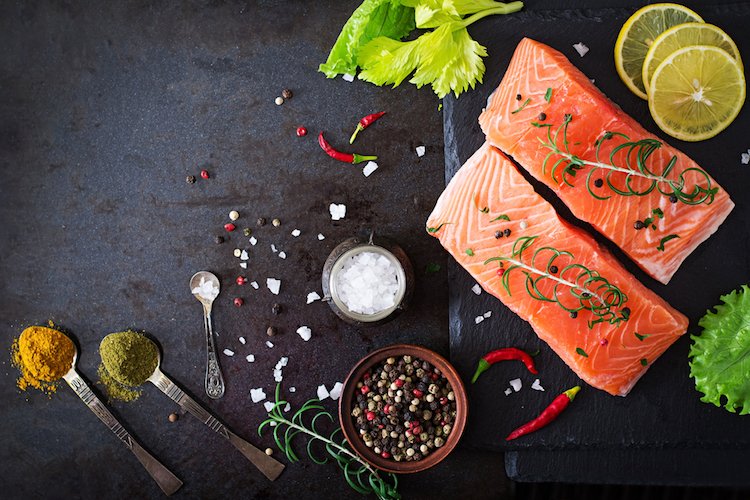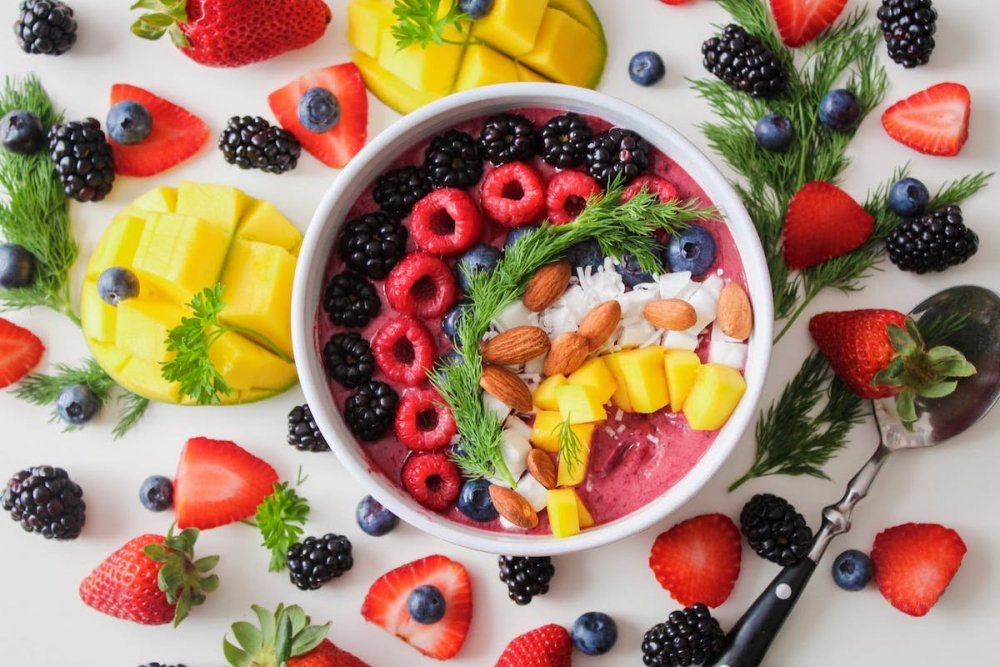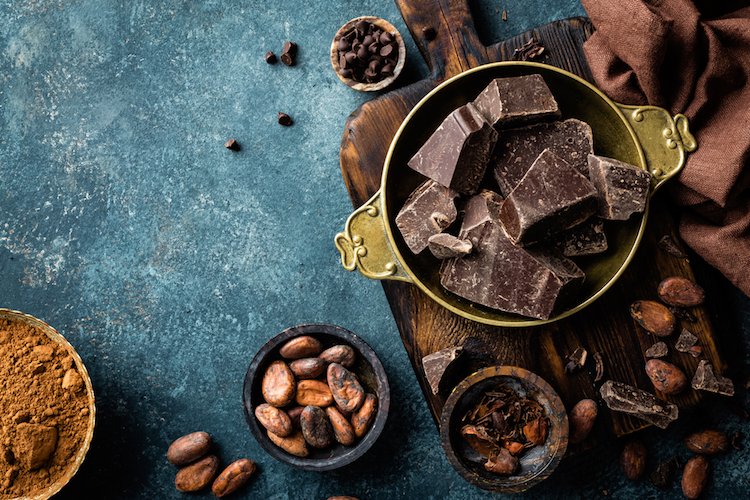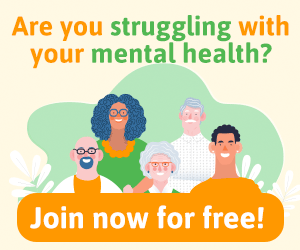The phrase 'you are what you eat' applies to our metal health too. These good mood food ideas from Calvin Holbrook could help improve symptoms of anxiety and depression.
When you feel anxious, depressed or just a little 'meh', it can be tempting to turn to chocolate, ice cream or a huge bag of potato chips in a bid to comfort eat yourself happier.
But before you open the fridge or cupboard door again, make sure you keep reading, because there’s growing evidence that you can actually boost your mood and happiness with food. Of course, it has to be the right type of food – what I refer to as 'good mood food'.
In fact, the food you eat can have a direct impact on your mood and happiness. If you’re feeling down, it could be because your levels of the neurotransmitter serotonin are low. Serotonin is a happiness hormone that helps regulate your mood, making you feel positive and confident. A lack of it is believed to contribute towards negativity, worrying, irritability and even insomnia.
In the human body, serotonin is converted from the amino acid tryptophan, which can be found in many high-protein foods. So, by eating foods containing tryptophan you can boost both serotonin levels and therefore your mood.
Good mood foods: eat yourself happy
Aside from tryptophan, other acids, vitamins and nutrients found in our foodstuffs can contribute to our overall mood, happiness and mental health. Improving your diet may also help you think more clearly and give more energy.
RELATED: The gut-brain axis
In fact, science is increasingly linking food to our mental health. A landmark 2015 article in the Lancet even stated that nutrition may be as essential to mental health as it is to cardiology, endocrinology and gastroenterology.
So, with that, here’s our pick of the top 8 good mood foods that can positively impact your mental health and happiness.
1. Seeds and nuts
Seeds and nuts are high in tryptophan which will be synthesized into serotonin, boosting and stabilizing your mood and also helping you to sleep better (and we all know how important good sleep is for mental well-being).
“Serotonin, a so-called happiness hormone, is converted from the amino acid tryptophan, which can be found in many high-protein foods: good mood foods.”
So, sow the seeds of health and add these to your shopping list: pumpkin seeds, almonds, cashews, chia seeds and pecans. Nuts can be expensive, so if you’re only going to add one of the selection to your shopping trolley, add walnuts: one handful of these brain-shaped nuts contains a whopping 318mg of tryptophan. Additionally, studies also suggest that a mere handful of nuts a day can also lower your risk of heart disease and cancer, so that's an added health bonus.
2. Salmon
It’s pretty in pink, packed with nutritional goodness and a great good mood food. Salmon is full of omega-3 fatty acids, a key nutrient not produced in the body. Omega-3 fatty acids make up part of the membranes that surround human cells, especially in the brain. Studies have shown that consuming omega-3 fatty acid-containing fish such as salmon may ease depression.
Additionally, salmon also fights inflammation, and increased inflammation in the body could play a role in depression, according to studies. Likewise, salmon is also a source of vitamin D, which is believed to help ease depression too. On top of that, this vitamin is essential for strong bones and teeth, as well as healthy muscles.

In the pink: salmon's a good mood food © shutterstock/timolina
3. Eggs
Eggs are a fantastic good mood food as they’re the source of several nutrients related to brain health –vitamins B6 and B12, choline and folate.
The B vitamins are essential for a range of cellular and metabolic processes, and they also play an essential part in the production of various brain chemicals. Meanwhile, choline is an important micronutrient that the body uses to create acetylcholine, a neurotransmitter that helps regulate both mood and memory.
“Eggs are a fantastic good mood food, as they’re the source of several nutrients related to brain health – vitamins B6 and B12, choline and folate.”
Indeed, two separate studies showed that higher levels of choline intake were linked to improved memory and mental function. Eating eggs is an easy way to get choline, but you must eat the yolk of the egg. That’s because that yummy yellow stuff is where the choline is concentrated.
• JOIN US! Chat and learn more about well-being and health in our online forums •
Deficiency in folate and B12 has been linked to depression, and folate deficiency is common in elderly people with dementia. Studies also show that folic acid supplements can help minimize age-related mental decline, so it follows that getting enough folate through eggs and other sources may help you.
4. Dark green vegetables
Your mother always told you to eat your greens, and she was right! Dark green vegetables are another rich source of folate. However, veggies such as broccoli and spinach are not only good mood foods because of folate’s mood-controlling affect, indeed, they contain other mental health benefits.
Iron, found in decent amounts in leafy greens such as spinach, is involved in many neurological activities. Its deficiency is associated with anxiety and depressive symptoms. Iron also helps the body to make healthy red blood cells. A lack of Magnesium has also been linked to depressive and anxiety symptoms, and the great news is this mineral is abundant in leafy greens also. Broccoli and kale are also thought to help suppress tumor and other cancerous cell growths.
Of course, eating all types of veggies, not just dark green ones, could be beneficial to mental health. A 2017 study from the University of Sydney looked at 60,000 Australians aged 45 and above and examined their fruit and vegetable consumption, lifestyle and psychological stress.
The results, published in the British Medical Journal, showed that those who consumed three to four servings of veggies per day reduced their risk of stress by 12 per cent compared to those who ate just zero to one serving.

Go green and veg out © shutterstock/4 PM Production
5. Tofu
Another vegetarian staple, tofu is made from soybean curd. Soya products are rich sources of tryptophan and you can substitute tofu for pretty much any protein, making it an excellent source of tryptophan for vegetarians and vegans alike. Tofu also contains no cholesterol and is low in calories; two more reasons to add it to your shopping list.
6. Berries
We all know that fruit is good for us, but did you know berries are a good mood food for boosting mental health? Strong scientific evidence from a 2012 showed that eating berry fruits has many beneficial brain effects, including helping to prevent age-related memory loss. The study proved that berries change the way neurons in the brain communicate. These signaling changes can improve motor control and cognition and help prevent brain inflammation that contributes to neuronal damage.
RELATED: The 15 Best Prebiotics to Include in Your Diet
Berry fruits also contain high levels of powerful antioxidants which help protect cells from damage by harmful free radicals. What’s more, they also contain flavonoids, which regulate mood and enhance memory.
If that wasn’t enough, they’re high in vitamin C, fibre, potassium and digestive enzymes, but low in calories. Add them to your cereal, porridge or yoghurt for a tasty, fruity pick-me-up!

Very berry: eat yourself happy
7. Turkey
Many meat-eaters only tend to gobble down this bird over the festive season, but the reality is that turkey is one of the best good mood foods you can consume. Turkey is low in fat and high in protein. This means it’s also high in the tryptophan and, consequently, the feel-good chemical serotonin. Turkey also has decent levels of B6, which is great for fighting off depression, stress, and is a memory booster, too.
8. Dark chocolate
OK, so let’s end our good mood food article on something we can all smile about! When we feel down, chocolate is often our top go-to comfort food, and if you pick the right kind of chocolate, you could see some benefits. Of course, the right kind is the antioxidant-rich dark variety, with a minimum of 70 per cent cocoa (put that Cadbury Dairy Milk back on the shelf!).
“Strong scientific evidence exists that eating berry fruits has many beneficial brain effects, including helping to prevent age-related memory loss.”
As mentioned earlier, iron deficiency is linked to depression and anxiety, so the good news is that a 100g bar of dark choc will provide you with 67 per cent of your recommended daily intake of iron (although that doesn’t mean you should eat two bars to hit your daily iron target – dark chocolate is still loaded with fat and calories).
Studies have shown that eating dark chocolate also boosts mood, helping you to feel content and calmer. Dark chocolate also contains phenylethylamine which encourages your brain to release feel-good endorphins. In fact, phenylethylamine is the same chemical your brain creates when you’re falling in love!

You should cocoa: chocs away! © shutterstock/Sea Wave
Conclusion: good mood foods
We all know that eating a diet that’s full of processed food, sugar and alcohol is not good for our well-being or happiness. Additionally, a lack of vital nutrients can be responsible for exacerbating the symptoms of some pre-existing mental health conditions. And consuming excessive amounts of coffee is also bad for anxiety and panic attacks.
Instead, the list of good mood foods we’ve outlined above provide you with many of the essential nutrients, amino acids and vitamins that can help improve your mood and overall happiness levels. It's really worth taking time to think about the food we put in our bodies and how it can affect our mood.
RELATED: How to Heal Your Gut – 11 Ideas to Restore Belly Health
To boost the benefits of these good mood foods further, it’s been suggested that eating them in a raw state could provide optimal results. A 2018 study from New Zealand’s University of Otago found that people who consumed produce in its uncooked state reported higher levels of psychological well-being compared to those who ate mainly cooked alternatives.
The study included 422 young adults, and researchers speculated that the micronutrients in fruits and vegetables are more easily-absorbed when consumed in their raw states, hence the benefits.
You can find a lot of our good mood food suggestions included in these fantastic recipe ideas from the BBC. Why not give them a try? Happy eating! ●
Main image: shutterstock/rawpixel.com
happiness.com | The fine art of being: learn, practise, share
Are you a happiness.com member yet? Sign up for free now to:
■ enjoy our happiness magazine
■ share and support in our happiness forum
■ self-develop with free online Academy classes
Written by Calvin Holbrook
 Calvin edits the happiness magazine, as well being an artist and travel lover. He also enjoys hiking, nature, swimming, yoga, sweaty dancing, and all things vintage!
Calvin edits the happiness magazine, as well being an artist and travel lover. He also enjoys hiking, nature, swimming, yoga, sweaty dancing, and all things vintage!




Join the conversation
You are posting as a guest. If you have an account, sign in now to post with your account.